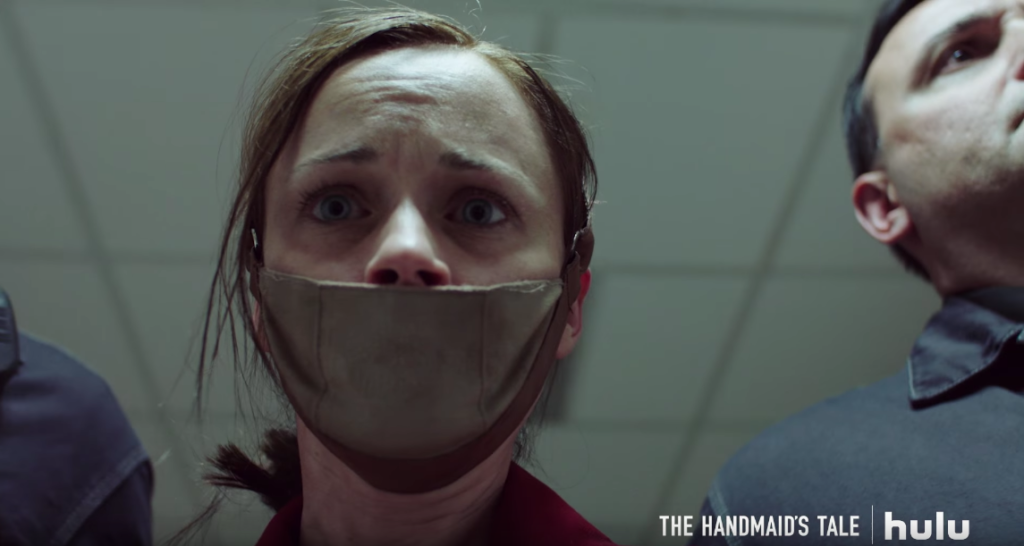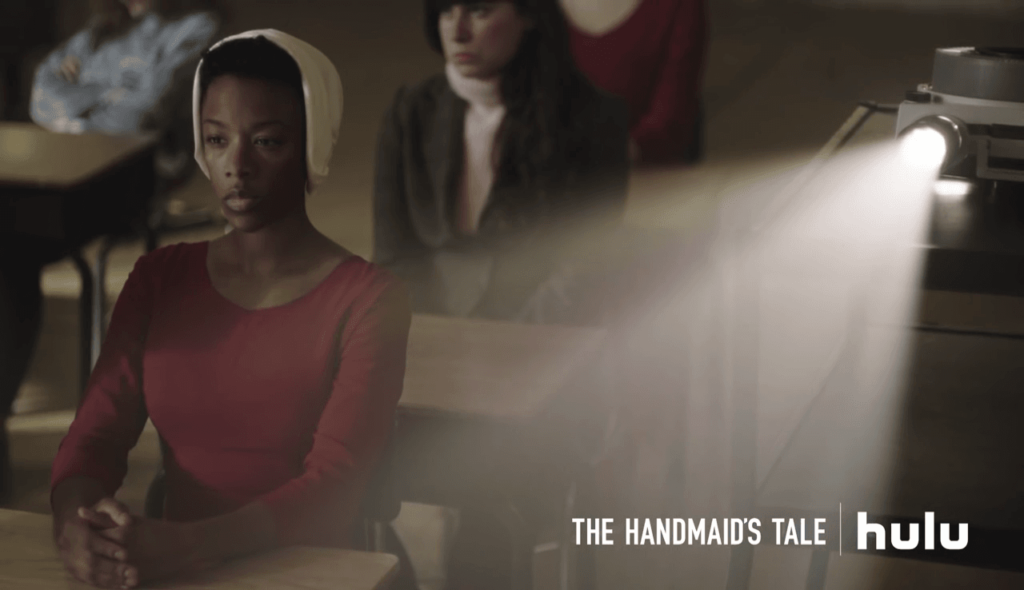Review: Hulu’s The Handmaid’s Tale Is a Horror-Filled Wake Up Call
I’ve seen a lot of scary movies in my time. Nothing comes close to the sheer dread I was filled with while watching Hulu’s The Handmaid’s Tale.
The Handmaid’s Tale, based on Margaret Atwood’s 1985 dystopian novel, starts streaming today on Hulu. Even though I was granted access to screeners a while ago I kept putting off writing about it. Why? Every time I thought about it, I got scared. It’s not a “horror film” but it might as well be, and a finely executed one at that.
Adapted from the classic novel by Margaret Atwood, The Handmaid’s Tale is the story of life in the dystopia of Gilead, a totalitarian society in what was formerly the United States. Facing environmental disasters and a plunging birthrate, Gilead is ruled by a twisted fundamentalism in its militarized “return to traditional values.” As one of the few remaining fertile women, Offred (Elisabeth Moss) is a Handmaid in the Commander’s household, one of the caste of women forced into sexual servitude as a last desperate attempt to repopulate the world. In this terrifying society, Offred must navigate between Commanders, their cruel Wives, domestic Marthas, and her fellow Handmaids – where anyone could be a spy for Gilead – all with one goal: to survive and find the daughter that was taken from her.
Orange is the New Black’s Samira Wiley also stars with Joseph Fiennes and Yvonne Strahovski. To say the adaptation does the original text justice is an understatement. The first three episodes were available to the press prior to being released on Hulu and I, perhaps stupidly, decided to watch them all in a row. I would not recommend binging The Handmaid’s Tale, you’re going to need to decompress after. Here were my initial thoughts.
Reviews are embargoed but I can say @HandmaidsOnHulu is beautiful and terrifying…portentous, harrowing, foreboding.
— Jill Pantozzi ♿ (@JillPantozzi) April 4, 2017
Unlike a lot of adaptations, main character Offred’s internal narration is included in the series. (Hannah Sole at Pajiba talks more about the changes from the book if you’re interested.) I’m glad they kept it because the story’s power comes from understanding what this vision of the world means to an individual, not just how things appear from the outside.
It’s an incredibly uncomfortable watch, and that’s the point, but it was almost too much for me. The creeping, quiet dread of the situation being presented to the audience is palpable. There is gross abuse of women by men in power and I have no doubt viewers will experience mental or physical distress over it as I did. This will be compounded if, like me, you’re queer.
One of the most obvious changes to the book is we expand from Offred’s view. We see a few other instances of what this new order is doing to people and it’s just as ugly. Women beaten down, mutilated, and sexually assaulted is the norm and the effects are traumatizing. But in Gilead, you can’t show you’re affected by it. You’re forced to adapt to the most heinous situation imaginable because the only alternative is death.
The series is brilliantly filmed and acted. Silence speaks volume, as do the slightest changes in facial expressions. It’s power is heightened because of the time we’re in. Read this excerpt from the book and tell me it doesn’t sound familiar.
This has been referenced a lot as of late but I'm reading Margaret Atwood's The Handmaid's Tale for the first time. This is no joke. 1985. pic.twitter.com/93Vf6hoTjz
— Jill Pantozzi ♿ (@JillPantozzi) February 10, 2017
I only read The Handmaid’s Tale recently and had to pause many times because of how close to home it was. For those who read it years ago it was already a frightening warning sign but also far enough removed that no one was really worried it would happen. But now we are and it’s almost incomprehensible. This could happen and it could happen fast. Don’t believe me? The comments on the series’ trailer by those unaware it was written in 1985 were innumerable and just happened to coincide with news of a room full of men deciding what was best for women. We have very good reason to be scared.
Comments on that Handmaid's Tale trailer pic.twitter.com/g76HLW9ie9
— Jill Pantozzi ♿ (@JillPantozzi) March 23, 2017
The adaptation gets to the point a lot quicker than the novel which is probably a good idea considering how little action occurs. Some is added, or explored further in the first three episodes and there’s some anachronistic music choices that didn’t click for me. It’s a valuable story but one I wish wasn’t so true-to-life. While watching the episodes I wondered how the series would be accepted. Would many be turned off by how close the story is to our current state of affairs? Will they watch purposefully for that reason? Would men understand the absolute terror we have seeing it unfold? Will it finally get across to some people why feminism is so important?
There’s new episodes available to me now but I honestly don’t know if I want to, or can, continue watching The Handmaid’s Tale. Writing this review brought back all the horrible feelings this provocative series instilled in me. Then again, I subconsciously wore red today.



Just finished episode 3 last night. They’re doing a wonderful job with it. I love the use of modern music in certain places, especially the credits of the first ep being played to “You Don’t Own Me.” It’s completely terrifying and they’re being very faithful to the book. Though they’re moving through book content at an alarming rate. I’m wondering where they’re going to go from here.
The one departure from the book that has me unsure is the complete elimination of racism from Gilead. On one hand, yes! Give black actors more roles! And I want Samira Wiley to be in all the things! On the other hand, eliminating the racism from Gilead is missing a big part of the group that’s in charge of it. A group that’s based on real people. The faux religious, totally sexist men that take over with Gilead aren’t concerned that enough people aren’t having babies, they’re concerned that enough white women aren’t having babies. It’s strange that they kept the antisemitism, but not other racism. Though the show is so difficult to watch already (like those final scenes in episode 3), so maybe it’s just that they needed a mental break from the hate.